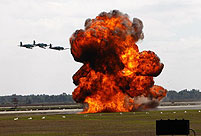This week, Chinese official media released photos and videos of China's first generation of nuclear-powered submarines and reported that the first is to be decommissioned after more than 40 years of service.
Many misinterpreted the reports as China showing off its military muscles, as the reports came on the heels of the Chinese Defence Ministry warning Japan not to underestimate China's resolve to safeguard the integrity of its territory in the East China Sea.
But the truth is the"display"of the submarines is not a show of China's military might, but rather another step in China's increasing military transparency.
As a responsible power and peace-loving country, China is increasing its military transparency step by step. In its national defense white paper in April, the Chinese military for the first time made public its military strength and composition, and the media coverage of the nuclear submarines is another step toward greater transparency. It's really ridiculous for some countries and their media to call on China to increase its military transparency on the one hand, and criticize China's efforts to do so as flexing its military might on the other.
In fact, this week's coverage was not the media debut of the nation's nuclear submarine fleet. As early as the 1980s, the People's Daily reported on the fleet and its underwater rocket launching capabilities.
Hence, the latest reports are not China's military suddenly revealing their muscles, as the fleet and its capabilities are not some secret weapon suddenly being revealed to scare other countries.
The big advantages of nuclear submarines as missile platforms is they can hide in deep water, where current technology is still not very effective in detecting them, and they can stay submerged for a long time: The first nuclear submarine launched by the United States in 1954, the USS Nautilus, could remain underwater for up to four months without resurfacing. Currently Russia operates fourth-generation of nuclear submarines but starts to develop fifth generation. And the US next-generation nuclear submarine may have an electric drive and new reactor plant that allow it to patrol the seas with near-silent stealth for half a century, according to NBC news reports.
These characteristics have made nuclear submarines strategic weapons of deterrence and they play a key role in national defense. By owning a nuclear submarine fleet, a nation can almost guarantee it will have the ability to respond in case of attack, thus deterring possible rivals from launching any strikes.
This is the reason why the world's major powers have all developed and upgraded their nuclear submarines. All the five permanent members of United Nations Security Council, namely the US, Russia, the United Kingdom, France and China, have nuclear submarines, and India began sea trials of its first indigenously built nuclear submarine, INS Arihant, in August.
China started its nuclear submarine program in the 1960s and its first nuclear submarine made maiden voyage in 1970. In the days of the Cold War, nuclear submarines were of key importance in preventing nuclear blackmails by the US and former Soviet Union, both of which were antagonist toward China.
Besides, having suffered repeated invasions from the sea in modern times, China wanted a strong navy and nuclear submarine fleet to act as deterrents to any future invasions.
Therefore, since it was first commissioned, China's nuclear submarine force has been clearly labeled "defense only"; this is in accordance with its military strategy, which is purely defensive in nature.
With some countries keen to play up "China threat" for their own purposes, there have been exaggerated reports of the power of China's nuclear submarine fleet in the Western media, some of which even claim the submarines can carry ballistic missiles with nuclear warheads and can target distant countries. But China's position on nuclear weapons is extremely clear: no first use of nuclear weapons, no use or threat of use of nuclear weapons against non-nuclear states, no export of nuclear weapons materials and technology.
These principles apply to nuclear submarines or nuclear missiles, too.
The US and Russia have the most advanced nuclear submarines, while the UK and France have the second best; China's nuclear submarine technology lags behind all of them, especially in their information and power systems. So it is ridiculous to talk an inferior member of the nuclear submarine club being a threat.
China adheres to a national defense principle of self-defense. For those who have no intention of harming China's territorial integrity and sovereignty, China's nuclear submarines are really nothing to worry about. Nuclear submarines serve the role of deterrence, and China will not easily resort to them unless under attack.
 Annual airshow kicks off in Houston
Annual airshow kicks off in Houston U.S. Navy Carrier Strike Group stages military exercises
U.S. Navy Carrier Strike Group stages military exercises Volkswagen showcases new energy vehicles in Beijing
Volkswagen showcases new energy vehicles in Beijing  How should we get married nowadays?
How should we get married nowadays?  Commentary:
Commentary: Jakie Chan sees Rubber Duck off in Beijing
Jakie Chan sees Rubber Duck off in Beijing Lingerie show dazzles Wuhan Motor Show 2013
Lingerie show dazzles Wuhan Motor Show 2013  Running in fun customs at Beijing Int'l Marathon
Running in fun customs at Beijing Int'l Marathon  Weekly Sports Photos
Weekly Sports Photos Unveil PLA air force base
Unveil PLA air force base  Say goodbye to tube-like apartment building
Say goodbye to tube-like apartment building Oriental education or western education?
Oriental education or western education? China in autumn: Kingdom of red and golden
China in autumn: Kingdom of red and golden National Geographic Traveler Photo Contest
National Geographic Traveler Photo Contest Chinese screen goddesses from Beijing Film Academy
Chinese screen goddesses from Beijing Film Academy Day|Week|Month